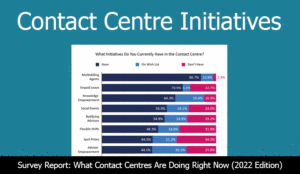If your contact centre has a number of active channels and aims to improve employee turnover and agent engagement, multiskilling is a no-brainer.
For most contact centres, traffic comes from multiple channels. Therefore, multiskilling and equipping the workforce to handle more than one line of enquiry is essential.
For agents, being tasked with chats, emails or phone calls alone can become repetitive, uninspiring and wearisome, which can only negatively impact your customer’s experience.
Multiskilling has been championed to ensure that agents are cross-skilled on a mix of channels and subjects to combat this problem and help maintain motivation levels in the contact centre.
But, according to almost 400 industry professionals, in the report ‘What Contact Centres Are Doing Right Now (2017 Edition)’, the stats tell a different story.
The percentage of contact centres that invest in multiskilling has decreased, dropping by 10% in 2017 alone. If the benefits of multiskilling are so clear then why do more centres choose not to invest?
Generally, staff in contact centres are much younger in comparison to other professions, with the average agent being under 30 years old. It is therefore vital for contact centres to help agents learn new skills by offering professional development opportunities.
The declining number of contact centres investing in multiskilling suggests that there is a lack of resources and time to conduct these necessary training programmes.
With almost 30% of contact centres not tailoring coaching and learning to the individual needs of the agent, centres risk demotivating agents, increasing attrition and damaging the customer service experience.
Automating real-time processes is the key to overcoming these hurdles and providing your customers with a seamless multichannel experience – tailored training can be added into periods of otherwise idle time at the push of a button.
Communication to a group of agents can be done instantaneously, ensuring that your centre can be as agile as possible in reacting to changing demands. The competing levels of demand can be proactively managed, meaning skilled staff are in place precisely when needed.
In addition, with more skills and a greater variety of work available to your agents, your workforce can be happier and more able to meet the needs of all of your customers.
To find out ore visit: https://qstory.ai
Author: Robyn Coppell
Published On: 3rd Apr 2018 - Last modified: 21st Aug 2023
Read more about - Guest Blogs, QStory















